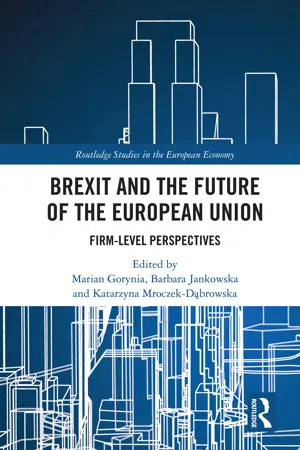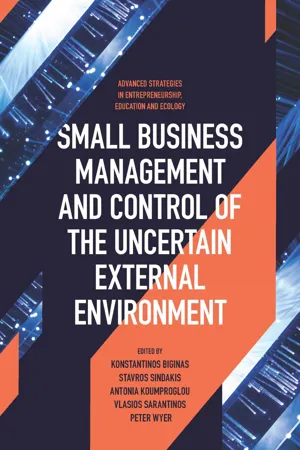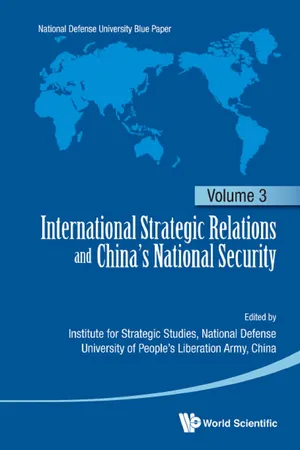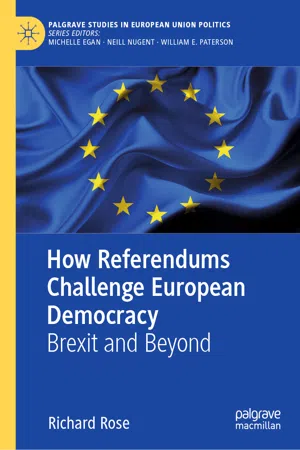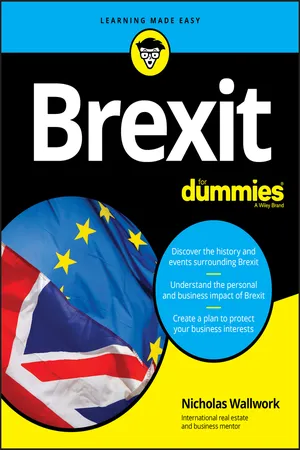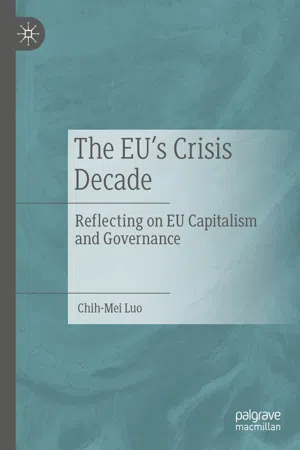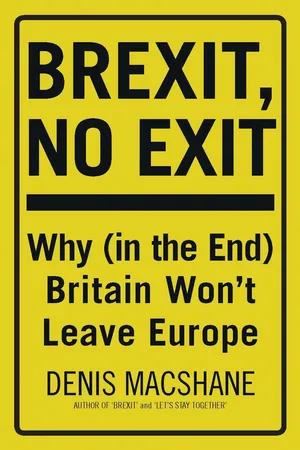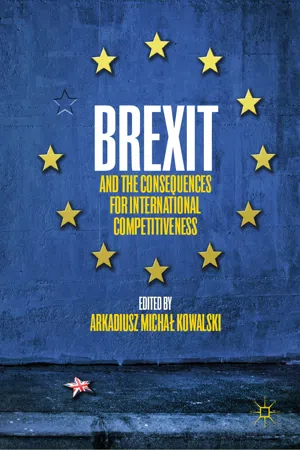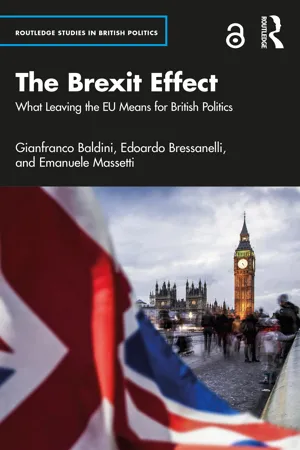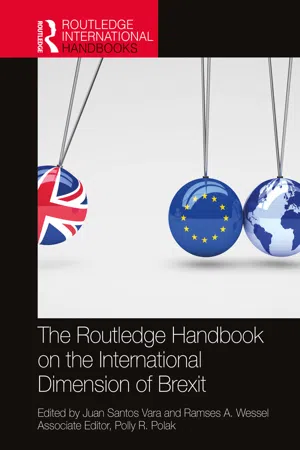Economics
Impact of Brexit on the EU Economy
Brexit has had a significant impact on the EU economy, leading to increased uncertainty and potential disruptions to trade and investment. The departure of the UK, a major economic player, has created challenges for the EU, particularly in terms of trade relations and financial services. The EU has been working to mitigate these effects and adapt to the new economic landscape.
Written by Perlego with AI-assistance
Related key terms
10 Key excerpts on "Impact of Brexit on the EU Economy"
- eBook - ePub
Brexit and the Future of the European Union
Firm-Level Perspectives
- Marian Gorynia, Barbara Jankowska, Katarzyna Mroczek-Dąbrowska, Marian Gorynia, Barbara Jankowksa, Katarzyna Mroczek-Dąbrowska(Authors)
- 2021(Publication Date)
- Routledge(Publisher)
The projected effects of Brexit on the EU and the UK1Marian Gorynia, Aleksandra Kania, Ewa Mińska-StruzikIntroduction
The origins of Brexit presented in Chapter 2 lead to a broader reflection, which boils down to the following questions:- What were the tendencies in international economic relations in the second half of the twentieth century and in the twenty-first century?
- Do these tendencies continue and are likely to continue, or do we face a period of re-evaluations and peculiar twists and turns?
- What are the fundamental challenges for humanity due to globalization regardless of Brexit and what impact can Brexit have on them?
- In what sense do contemporary processes form the Brexit’s basis and context? What does Brexit change in these tendencies?
The UK’s decision to leave the EU was a landmark moment for European integration. The British electorate voted to leave the EU by a 51.9% majority. The result of the referendum on Brexit organized on June 23, 2016, surprised many observers and started a series of attempts to anticipate what the consequences would be for both the British and European economies. Several institutions published model-based forecasts on the economic consequences of Brexit, including the OECD, Oxford Economics, the Centre for Economic Performance, PricewaterhouseCoopers (PwC) and HM Treasury. Some experts, such as those from PwC, predict a slight negative impact of Brexit on British GDP, which equals 1.3% in the short term. Others, such as the researchers from the Centre for Economic Performance, predict a significant fall in British GDP in the long run, which equals 9.3%. All these institutions adopted two assumptions for the UK’s relations with the EU after Brexit. First, the UK would make a zero or lower contribution to the EU budget, depending on the state’s access to markets. Second, trade relations between the UK and the EU would change (Armstrong, 2016). - Konstantinos Biginas, Stavros Sindakis, Antonia Koumproglou, Vlasios Sarantinos, Peter Wyer, Konstantinos Biginas, Stavros Sindakis, Antonia Koumproglou, Vlasios Sarantinos, Peter Wyer, Konstantinos Biginas, Stavros Sindakis, Antonia Koumproglou, Vlasios Sarantinos, Peter Wyer(Authors)
- 2022(Publication Date)
- Emerald Publishing Limited(Publisher)
Sampson, 2017 ). This may cause long-lasting damage to the British financial sector in that it might set off a dangerous process of brain drain that would undermine one of the principal reasons London rose to prominence. Clearly, this needs to be given serious consideration when assessing the overall impact of Brexit on the UK’s knowledge economy. A main concern involves an effect on the whole trading system and fluctuating currency values. One early effect was higher inflation in the UK market in 2018.A key objective of this chapter is to understand the plight of small businesses and how entrepreneurship will be affected through working under different EU–UK relationships and UK relationships with other economies. Associate issues include relevance and impact of small business operational culture, financial needs and strategic management tools and skills (Druker, 2009 ; Eshima & Anderson, 2017 ). The Brexit threat is also unfolding in the context of the new start-up culture and emerging platform of E-business setups, with associate shift of business model and leadership style in the business. Hence, let us first understand the two main aspects of these topics, that is, Brexit and the state of small businesses in the EU (McCann & Ortega-Argilés, 2016 ). Though Brexit was initiated by the UK Prime Minister, the main sticking point why even after two years Brexit was not completed was the issues of backstop for which the Conservative MP’s and the Democratic Unionist Party were battling. However, the key potential implications for small business trade of a fully implemented Brexit could be identified at an early stage, including:- Trade cost will increase.
- Transfer pricing may be impacted.
- Non-benefit of Free trade agreements (FTA) of the EU countries to non-EU countries.
- High impact over the gross domestic product (GDP) ratio of the UK’s economy.
- Political implications.
Given that the majority of the UK enterprises fall under the category of SMEs, with small businesses playing a vital role in the economy (Pryce, Nielsen, & McCabe, 2019), Brexit impacts such as those outlined above are likely to have high significance in economic, business and social development terms.2. Literature Review
- Institute for Strategic Studies, National Defense University of People's Liberation Army China(Authors)
- 2018(Publication Date)
- WSPC(Publisher)
16 Moreover, since the UK is the sixth largest economy around the globe, a permanent member of the UN Security Council, and a nuclear power, its exit from the EU will undoubtedly and substantially diminish the EU’s economic, diplomatic, and security strengths and decrease its discursive power in international regimes. Generally speaking, in international politics, changes in the balance of power are bound to cause structural changes, and the global power landscape is likely to change in the future as a result of these changes. In particular, the EU will be engaged in dealing with its internal affairs for quite a long time and have no time to attend to other external things. Multiple crises are so entangled that it will be very complex and hard to overcome them. All these will limit the EU’s desire to participate in international governance, and the EU’s capabilities will also decline to some extent.Second, the EU’s role model effect has been downplayed. The EU has always been advocating multiculturalism and inclusiveness, which is the fundamental fountainhead for the public of each EU member state to realize their “European identification” and is one of the important achievements of European integration, and even plays an exemplary role around the globe. Europe always has its own special geographical and humanistic environments, and European countries have different races, languages, religions, and customs as well as different development situations. Therefore, only by respecting and treating each other equally can they seek their common European identity under the precondition of retaining their own traditional cultures. It is this kind of European identity that has discarded the history in which nation states restricted their activities to designated areas and engaged in life-and-death battles for the sake of their own interests, and it is also this European identity that has institutionally solved the problem of peace in Europe. As a result, Europe has become an example of the current globalization, namely, seeking common ground while reserving differences for common development, and this is an important embodiment of the EU’s “soft power”. At the same time, as the cradle of modern capitalism, Europe has always boasted itself as the fountainhead of the Western civilization, and its human rights values have been regarded as the embodiment of its advanced nature. As far as the refugee problem is concerned, the EU acted at first out of humanitarian considerations with a deep sense of historical responsibilities for its former colonies in the Middle East and North Africa. Therefore, the EU took a relatively open attitude to refugees, believing that it could tolerate different religious, cultural, and ethnic groups. However, things have gone contrary to its wishes. The EU has been mired in a complex and thorny dilemma due to its attitude. Germany, the most active EU member state in taking refugees, has even been condemned as promoting “moral capitalism”. In fact, Europe is still a society whose mainstream is Christianity (including the Catholic Church, the Protestant Church, and the Eastern Orthodox Church). Although European governments have attempted to keep neutral relations between different religions, things have actually gone contrary to their wishes. In particular, more and more Muslim migrants from other countries are out of tune with the mainstream European society. This has made a clash of civilizations inevitable, and the EU’s humanitarian relief can even evolve into a humanitarian disaster. Consequently, the values always advocated by the EU have met serious challenges, and the EU’s “model student” aura is no longer in existence.- eBook - ePub
How Referendums Challenge European Democracy
Brexit and Beyond
- Richard Rose(Author)
- 2020(Publication Date)
- Palgrave Macmillan(Publisher)
Brexit: Why Britain Voted to Leave the European Union . Cambridge: Cambridge University Press.Crossref- Coutts, K., G. Gudgin, and J. Buchanan. 2018. How the Economics Profession Got It Wrong on Brexit. Working Paper 493, Cambridge Centre for Business Research.
- Gudgin, G., K. Coutts, and N. Gibson. 2017. The Macro-Economic Impact of Brexit Using the CBR Macro-Economic Model of the UK Economy. Working Paper 483, Cambridge Centre for Business Research.
HM Government. 2016a. HM Treasury Analysis: The Long-Term Economic Impact of EU Membership and the Alternatives . CMND 9250, April, London, https://www.gov.uk/government/publications .HM Government. 2016b. HM Treasury Analysis: The Immediate Economic Impact of Leaving the EU . CMND 9292, May, London, https://www.gov.uk/government/publications .King, M. 2017. The End of Alchemy: Money, Banking and the Future of the Global Economy . London: Abacus.Knight, F.H. 1921. Risk, Uncertainty and Profits . Boston, MA: Hart, Schaffner & Marx and Houghton Mifflin Company.Minsky, H.P. 1982. Can ‘It’ Happen Again? . Armonk, NY: M. E. Sharpe.Minsky, H.P. 1986. Stabilizing an Unstable Economy . New Haven, CT: Yale University Press.Offer, A., and G. Söderberg. 2016. The Nobel Factor: The Prize in Economics, Social Democracy and the Market Turn . Princeton, NJ: Princeton University Press.Crossref- Office for Budget Responsibility. 2018. Brexit and the OBR’s Forecasts. Discussion Paper No. 3.
Phillips, A.W. 1958. The Relation Between Unemployment and the Rate of Change of Money Wage Rates in the United Kingdom. Economica 25 (100) (November): 283–299.Taleb, N. 2007. The Black Swan: The Impact of the Highly Improbable . London: Penguin.Tett, G. 2009. Fool’s Gold: How Unrestrained Greed Corrupted a Dream, Shattered Global Market and Unleashed a Catastrophe . London: Little Brown.Wray, L.R. 2016. Why Minsky Matters: An Introduction to the Work of a Maverick Economist - No longer available |Learn more
- Nicholas Wallwork(Author)
- 2019(Publication Date)
- For Dummies(Publisher)
Part 3Getting Down to Business: The Impact of Brexit on UK Companies
IN THIS PART … Prepare for changes in importing and exporting to and from the European Union. Look at potential transport and logistics hurdles that may result from Brexit. Understand employment issues. Get ready for other potential business impacts of Brexit. Undertake a Brexit impact assessment for your business.Passage contains an image Chapter 5
Importing and Exporting Goods and Services between the UK and the EU
IN THIS CHAPTERSetting Brexit in context by looking at UK trade around the worldScoping out the big-picture issues for importing and exportingAssessing the short-term changes in importing and exporting after BrexitPreparing for longer-term changes in importing and exporting to and from the EUGoing beyond the EU for trading opportunitiesBack in the oh-so-innocent days of July 2017 — at a time when the United Kingdom (UK) had barely begun formal negotiations with the European Union (EU) on a Brexit withdrawal agreement — the UK’s international trade secretary, Liam Fox, gave an interview to BBC Radio 4’s Today program. In that interview, he uttered the words, “The free trade agreement that we will have to do with the European Union should be one of the easiest in human history.”One of the easiest in human history. Let that prediction sink in for a moment. Given that the UK–EU negotiations on the withdrawal agreement were anything but easy (and remembering that the withdrawal agreement only covers the UK’s exit from the EU, not its long-term trading relationship — see Chapter 3 ), Fox’s words seem a little too … optimistic.Given that the UK Parliament didn’t even agree on what sort of Brexit it wanted, Fox’s words are bordering on delusional. (To borrow a sentiment from When Harry Met Sally … , - eBook - ePub
The EU's Crisis Decade
Reflecting on EU Capitalism and Governance
- Chih-Mei Luo(Author)
- 2019(Publication Date)
- Palgrave Macmillan(Publisher)
But its credential of being the centre of uniting divisive countries in Europe, which is its very original purpose, was questioned. As Oliver (2016 : 1323) observes from 59 analyses that most commentators view Brexit to cost the UK economy much more than to the EU’s and its impact to the EU, therefore, was rather political than economic. As Germany’s economic minister, Sigmar Gabriel, indicates, Brexit was not an economic challenge to the EU but more a psychological and political one (The Guardian, 30 August 2016). Raines (2016b) argues that, after Brexit, the EU has to prove it is still a model for the future international cooperation. As Luxembourg’s foreign minister, Jean Asselborn, rightly points out, the EU has to explain ‘why we needed the European Union after World War II and why we need the European Union for this century’ (EU Observer, 25 July 2016). Barysch and Bildt (2016) predict that the Brexit incident, in the short term, will lead to anti-EU populist parties growing stronger and louder in their demands. It will also put a pause to European integration as only one in four Germans and one in five Italians prefer to see more EU integration, while 40% of people surveyed would rather see some powers to be returned from the EU to national governments. What is more significant, they argue, is Brexit’s long-term effects on the EU. They point out that, for over 50 years, the EU has been the driving force of European politics. It has helped overcome national divisions and stabilize democracy for its member states. Brexit has made the EU’s magnetism substantially diminished and thus exposed the continent to the risk of reverting to historical old patterns of national divisions and divergences - eBook - ePub
Brexit, No Exit
Why (in the End) Britain Won't Leave Europe
- Denis MacShane(Author)
- 2017(Publication Date)
- I.B. Tauris(Publisher)
As the pound slumped, Apple increased the price of its new iPhone7 because of the Brexit devaluation and Microsoft raised the price of its computers by up to 15 per cent. Investment funds closed their books to prevent investors pulling money out of the UK ahead of Brexit. Overseas businesses said they were not sure if they would keep investing in a UK outside the Single Market, and the governor of the Bank of England slashed interest rates hoping this would restore confidence. The result was that pensions which depend on funds assuming a certain interest rate on their invested money faced being cut as interest rates were close to being negative.The American Chamber of Commerce in Britain said that the US$600 billion of investment in the UK would come under threat in the event of full Brexit. Using more forthright language than the Conservative-friendly British business outfits, American business leaders in the UK dismissed as ‘nonsense’ the argument of anti-European ministers that firms in the UK could trade normally with the EU using WTO rules and accepting the tariffs the EU applies to any good imported from outside its border.In October 2016 Britain’s finance ministry, the Treasury, warned that a full Brexit would lead to a 9.5 per cent reduction in the nation’s GDP, with tax revenues of £66 billion – about twice the UK defence budget – disappearing. Even the pro-Brexit Open Europe think-tank estimated that leaving the Customs Union would reduce British GDP by at least 1.5 per cent, while other economists reckoned that leaving the Customs Union would cut 4.5 per cent from the value of the British economy. The pound sterling became a political currency of exceptional volatility. Suddenly wines, cheeses, even the delicious Spanish ham, pata negra, became more expensive to bring into Britain. The British Retail Consortium warned that outside the EU the duties on imported meat products could rise 27 per cent and the duty on popular Chilean wine 14 per cent. The Japanese ambassador in London said that losing the right to trade and clear euros would have ‘nightmarish’ consequences for Japanese finance houses that had set up in London on the assurance that Britain would always have full access to the Single Market.Not all the economic news was bad. Britain remained a fully functioning member of the EU and profited from its four freedoms of allowing capital, goods, services and workers to go where they could create or add the most value. The vote in June 2016 was not Brexit itself, so growth had been steady in 2016 and held up in the months after the vote. All EU member states were posting growth in 2017, so Britain enjoyed its share of that growth. The devaluation of the pound sterling following Brexit meant that foreign tourists coming to London to shop and spend money had a bonanza. The top 100 FTSE companies listed on the London Stock Exchange were able to post higher profits from overseas earnings converted into devalued sterling so their shares rose. - Arkadiusz Michał Kowalski, Arkadiusz Micha? Kowalski, Arkadiusz Michał Kowalski(Authors)
- 2018(Publication Date)
- Palgrave Macmillan(Publisher)
© The Author(s) 2018Begin AbstractArkadiusz Michał Kowalski (ed.)Brexit and the Consequences for International Competitiveness https://doi.org/10.1007/978-3-030-03245-6_1313. The Potential Impacts of Brexit on the Japanese Economy
End AbstractAnna Maria Dzienis1(1) Collegium of World Economy, SGH Warsaw School of Economics, Warsaw, Poland13.1 Introduction
Japan is the world’s third-largest economy and the EU’s second-biggest trade partner in Asia. Since 2013, Japan and the EU have been negotiating an Economic Partnership Agreement (EPA), the conclusion of which is expected to bring further trade facilitation. However, the results of the 2016 UK referendum brought a new perspective to the debate. Moreover, many UK-based Japanese firms have started considering how to respond to new regulations and how to deal with risk connected to exchange rate fluctuations after the UK leaves the EU.This chapter provides an analysis of the internal and external situation of Japan against the background of recent developments in the EU related to Brexit . The first section examines current economic policy in Japan and sheds light on Japan’s perception of “the UK issue”. The second section serves two purposes: it describes Japan’s foreign trade and reports on Japan’s outward foreign direct investment (OFDI). The third section follows up on the previous one in the context of international agreements, with a focus on the Japan-EU Economic Partnership Agreement .As the UK’s House of Commons admits, much about the UK exit negotiations remains unclear and unknown: its mechanics, legal effects, policy consequences. The biggest ‘unknown’ is what the withdrawal agreement and any other Brexit -linked agreements are going to contain .113.2 Is Brexit Uncertainty Hitting Japan’s Economic Policy?
The burst of the real estate bubble in the late 1980s derailed Japan from its path of dynamic economic growth. The worsening performance of Japan’s economy exacerbated deflationary trends that have been present in the country since 1998. The Bank of Japan’s governor, Haruhiko Kuroda, in a speech at the Council on Foreign Relations in New York on 10 October 2013 cited the example of the deflation situation in Japan and said that the minimum fare of JPY 160 for a subway ticket in Tokyo has not changed since 1995; while in New York, the charge has increased by over 60%.2- eBook - ePub
The Brexit Effect
What Leaving the EU Means for British Politics
- Gianfranco Baldini, Edoardo Bressanelli, Emanuele Massetti(Authors)
- 2022(Publication Date)
- Routledge(Publisher)
Chapter 1 ) by challenging the principle of parliamentary sovereignty, introducing a sort of rigid constitution, promoting federalising tendencies, and lowering the entry barriers for third parties. Furthermore, with the extension of Qualified Majority Voting (QMV) in the Council of Ministers, and with the strengthening of the EP in law-making, the UK government lost its capacity to fully control EU policies (which it could previously veto, if considered unacceptable or damaging for the country). Incidentally, when the UK government was on the losing side in the Council of the EU, the accountability of ministers was also negatively affected, since no one could be held accountable for a policy agreed by a majority of EU members.2.4 Back to Westminster? The impact of exiting the EU
Disentangling the complex knot of relationships with the EU is a difficult and untested exercise that will need some time in order to be brought to completion. Impact assessments on the economic consequences of Brexit have been a contentious issue during the process, to the point that the then Brexit minister, David Davis, faced a charge of “contempt of parliament” in 2017, due to his refusal to release them in full. Understanding the political and institutional consequences of the Brexit process could be an equally difficult task. As the EU is removed from decision-making, Brexit inevitably entails internal change, as both policies and governing practices need to be adapted or reinvented. While we share, in principle, the proposition that “in itself Brexit does not determine the extent or form of this restructuring” (Wincott 2020 , 1582), we believe that hypotheses on the most likely directions of change can be formulated.2.4.1 Dimension 1: elections and the party system
To start with the first dimension, our expectations are the result of the interplay between the implications of the 2016 referendum (as an event) and of the ensuing Brexit process to implement the exit from the EU. The immediate expectations for the first elections after the referendum were related to a reduction in party system fragmentation, mainly through the reabsorption of UKIP, a single-issue party that was formed to bring the country out of the EU and which had won 27 percent of the votes in the 2014 EP elections, thus increasing its electoral threat to the Conservatives (but also to Labour: Ford & Goodwin 2014 ). This party had also experienced great success in the 2015 general elections when its breakthrough in Westminster was only avoided by the mechanics of the SMP electoral system. At the same time, Theresa May’s inability to get the Withdrawal Agreement through Parliament led the country to take part in the EP election in May 2019 (see Chapter 1 - Juan Santos Vara, Ramses A. Wessel, Juan Santos Vara, Ramses A. Wessel(Authors)
- 2020(Publication Date)
- Routledge(Publisher)
The author proves that the early steps taken by the authorities in London have focused merely on rolling-over pre-Brexit agreements. The analysis of 20 agreements concluded thus far proves that EU agreements have not only served as a point of departure for post-Brexit deals, they have been either directly or indirectly copy–pasted into UK agreements with third countries. As explained at the beginning of this introduction, Brexit has important implications for the relationship between the EU and the UK with other states and international organizations. Part III of the handbook aims to explore the impact of the withdrawal of the UK from the EU on the participation of these actors in other international organizations and in EU diplomacy itself. Gregory Messenger analyses in Chapter 10 the relationship between the UK and the EU at the WTO. In identifying the core legal questions arising from UK withdrawal from the EU for trade relations at the WTO, Messenger looks to possible areas of cooperation and disagreement for both parties, challenging expectations that they will fall into either a dynamic of confrontation or subservience. Instead, he argues that the experience thus far, and the priorities for the future, set the ground for a relationship built on constructive creative competition. In Chapter 11, Jan Wouters focuses on the implications of Brexit for the functioning of the United Nations Security Council (UNSC) from the perspective of the EU. He outlines the importance of the UK’s permanent seat in the context of the Brexit debate, both from the viewpoint of the UK and from the EU and its 27 Member States. Wouters explores what as of now has been agreed about the UK and EU’s future relationship within the UNSC, in particular in the ‘Political Declaration setting out the framework for the future relationship between the European Union and the United Kingdom’
Index pages curate the most relevant extracts from our library of academic textbooks. They’ve been created using an in-house natural language model (NLM), each adding context and meaning to key research topics.
